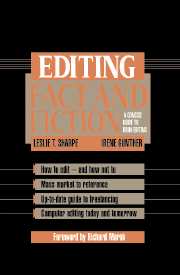Book contents
- Frontmatter
- Contents
- Foreword
- Acknowledgments
- Introduction
- Chapter 1 Who (and What) Is an Editor?
- Chapter 2 Fact or Fiction? Finding Your Niche
- Chapter 3 Principles to Edit By
- Chapter 4 The Editor's Senses
- Chapter 5 The Editor's Sensibility
- Chapter 6 A Guide to Editorial Freelancing
- Chapter 7 Electronic Editing Today and Tomorrow
- Chapter 8 Tools of the Trade and How to Use Them
- Index
Chapter 5 - The Editor's Sensibility
Published online by Cambridge University Press: 21 September 2009
- Frontmatter
- Contents
- Foreword
- Acknowledgments
- Introduction
- Chapter 1 Who (and What) Is an Editor?
- Chapter 2 Fact or Fiction? Finding Your Niche
- Chapter 3 Principles to Edit By
- Chapter 4 The Editor's Senses
- Chapter 5 The Editor's Sensibility
- Chapter 6 A Guide to Editorial Freelancing
- Chapter 7 Electronic Editing Today and Tomorrow
- Chapter 8 Tools of the Trade and How to Use Them
- Index
Summary
“You must enter into the author's mind, mode, and purpose.”
“I think an author's style and vision are extremely important. You sense when something has a creative spark.”
“The whole purpose is not to change the author, but to strengthen the book.”
(To author:) “This is your book, you are the final arbiter. All I can give you is my passion, my interest, and what I consider my most reasonable judgment.”
These statements, all from trade book editors, encapsulate the sensibility a good editor has toward authors and their work. Such a sensibility is not automatic; it develops with a growing knowledge of the craft of editing, through constant reading, and, of course, through the experience of dealing with many kinds of authors and many types of books. In addition, the principles we articulated in Chapter 3–tact, flexibility, confidence, respect for the author, and responsibility to the book–all play a role in developing the editor's sensibility.
Entering into the author's mind and mode, understanding the author's purpose, implies having literary taste, the ability to recognize good writing; according to one editor, literary taste in turn presupposes being familiar with–and accepting–many different styles of writing as well as having some knowledge of other languages and their literature.
Empathy with a writer's vision requires sensitivity to the act of writing and to what the writer goes through in the process of attaining that vision. It entails being able to say to the author, “This is your book” (and meaning it).
- Type
- Chapter
- Information
- Editing Fact and FictionA Concise Guide to Book Editing, pp. 130 - 156Publisher: Cambridge University PressPrint publication year: 1994



